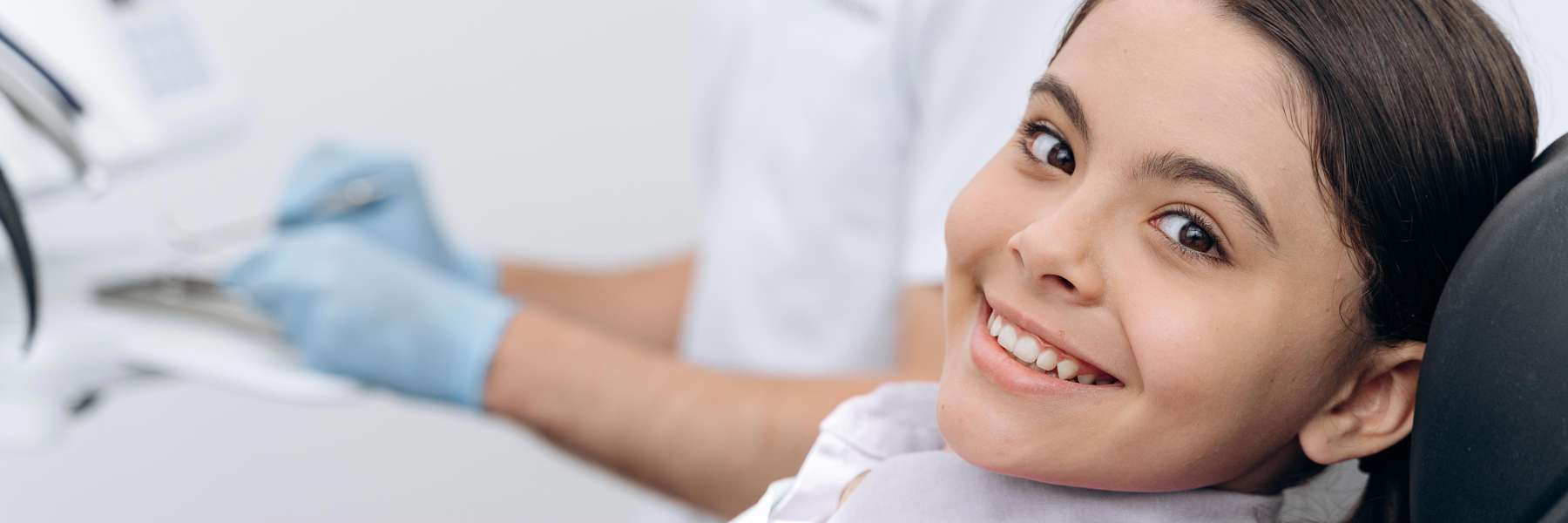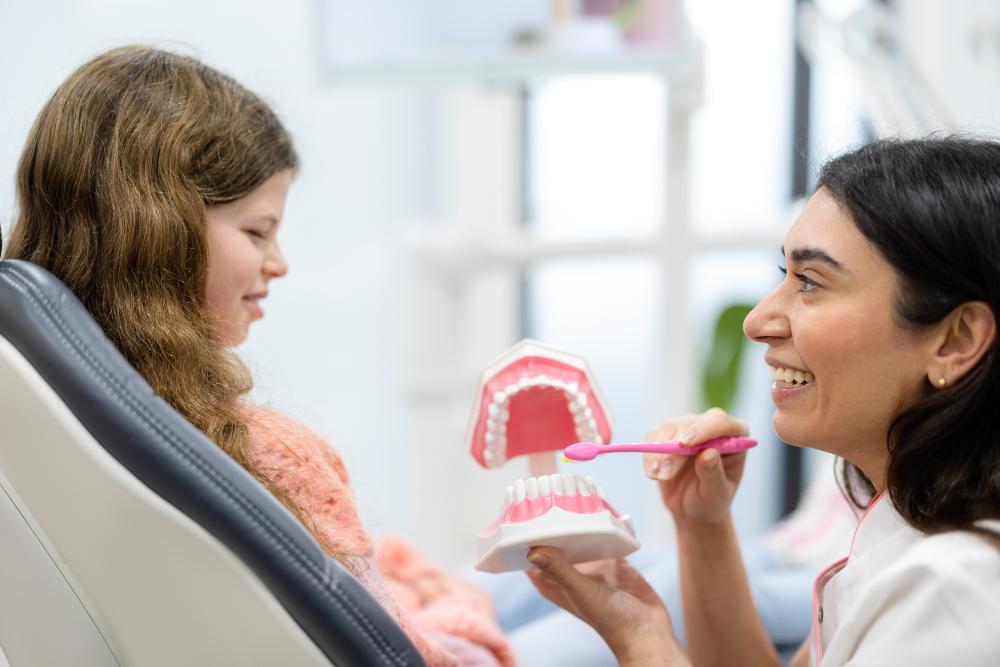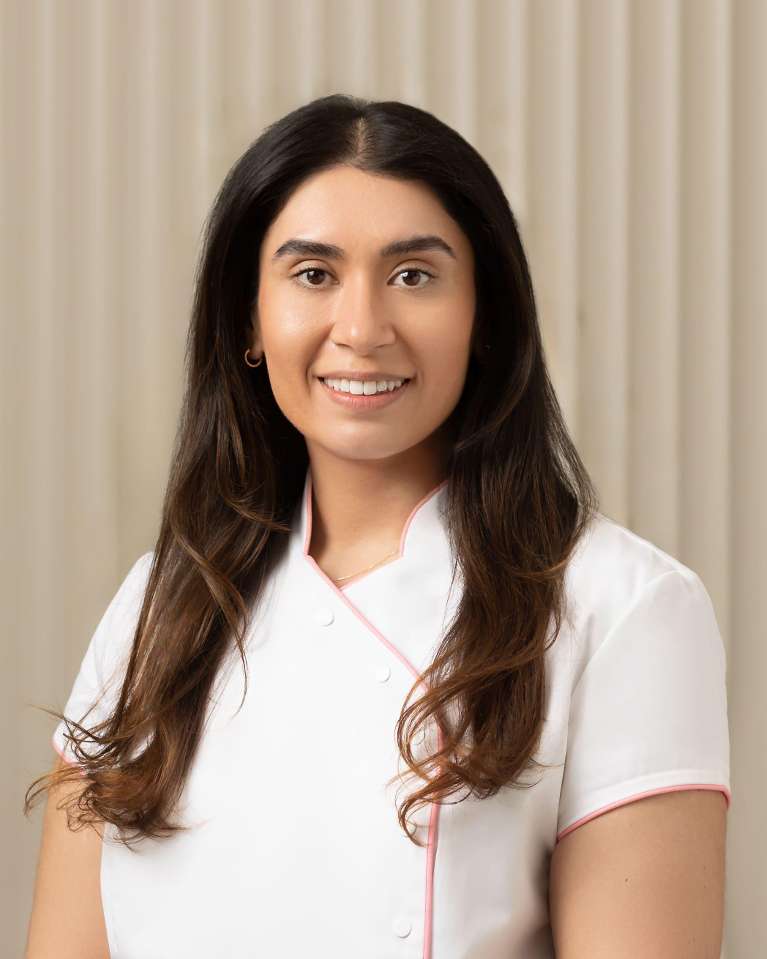
Early Intervention Orthodontics

As the name suggests, Early Intervention or Interceptive Orthodontics is treatment that aims to direct a child’s growth and development in order to correct or prevent certain kinds of orthodontic problems.
By undertaking treatment early, the goal is to reduce the need for treatment later, particularly aiming to avoid the need for tooth extractions where possible.
Early Intervention/Interception Orthodontic treatment can start as early as 6 years old up to approximately 11 or 12, when there is a mixture of baby and adult teeth.
How does Early Treatment Work?
Depending on the scenario, there are different types of removable expansion plates and appliances that are used to gently guide the growth of the jaw and guide incoming permanent teeth into a better position.
Why Would We Act Sooner Rather Than Later?
Early treatment, when necessary and conservative, can lead to faster, simpler, more predictable and successful later treatment.
Early Treatment Benefits Include
- Avoiding tooth extractions
- Create space for permanent adult teeth
- Guide permanent adult teeth into a more suitable position
- Correct jaw growth to promote facial symmetry
- Improve the way lips meet
- Reduce the likelihood of having impacted permanent teeth
- Eliminate thumb-sucking
- Correct abnormal swallowing or speech problems.
- Reclaim spaces where baby teeth were extracted or lost, and the adjacent teeth have drifted into the site.
Will I Still need Braces Later?
Most early orthodontic treatments require a simple second phase of treatment when all the adult teeth are present to achieve the final bite, with either Invisalign or fixed braces around age 12-14 years onwards. In some cases, the orthodontic problem will have been resolved in early intervention treatment so further treatment is not needed.
Shall I just Watch and Wait until all Adult Teeth are Present?
In the past, it was thought that children should begin orthodontic treatment between the ages of 12 and 14, when all their adult teeth have erupted. If we wait until this stage to correct crowding, we are limited to only mechanical forces; therefore, adult teeth could require extractions due to the lack of space in the mouth.
In cases such as a severe overbite, crossbite, or underbite, when the face and jaw are fully developed, it becomes much more challenging to achieve dramatic results, and waiting until adulthood may necessitate surgery. With early orthodontic treatment, we intercept and correct the issue before it has a chance to become a more significant problem.
Why Are My Child’s Teeth Crowded, or In the Wrong Position?
Several studies have shown that in most cases, tooth crowding in children is due to negative oral habits or conditions that impact skeletal or bone development.
habits or conditions that impact skeletal or bone development.
Such Habits/Conditions Include:
- Mouth breathing
- Poor tongue posture
- Blocked airways/ nasal passages
- Enlarged tonsils and/or adenoids – leading to poor nasal breathing
- Chronic allergies, allergic rhinitis, seasonal allergies that are not well managed.
- Tongue thrust (forward tongue position when swallowing)
- Thumb sucking or prolonged dummy use
- Incompetent lip seal (open lips at rest)
These habits can result in narrow jaws, which means less space for developing adult teeth and therefore crowding.
Early interceptive orthodontics aims to develop the face and jaw correctly by creating more space for the adult teeth to comfortably grow into.
My Child Is Grinding Their Teeth at Night. Is This Normal?
Tooth grinding during sleep can be a sign of an upper airway obstruction called Sleep Disordered Breathing (SDB). SDB is a form of a serious sleep disorder known as Obstructive Sleep Apnoea (OSA), which is a common childhood problem.
Your child’s teeth will appear excessively worn because of night-time tooth grinding or they may notice they feel more tooth sensitivity when they eat hot and cold foods.
They could be more likely to bite the tissue inside their cheeks, and you may notice they have a narrower arch and not enough space for developing adult teeth.
Excessive tooth grinding in young children may indicate a need to expand the upper arch as part of early orthodontic treatment. If left untreated, teeth grinding can cause significant tooth wear, resulting in a loss of needed space between the upper and lower jaws.
This can cause incorrect positioning of the jaw and result in abnormal tongue thrusting patterns or difficulties swallowing.
Untreated SDB Can Also Result in Other Symptoms:
- Bedwetting
- Behavioural concerns similar to ADHD
- Daytime fatigue or sleepiness
- Overall failure to thrive
- Poor concentration, memory, or focus
- Poor mental /physical stamina
More severe cases of SDB that are left untreated may lead to more severe health problems for your child, such as diabetes or cardiac complications.
 Are Frequent Ear Infections Related?
Are Frequent Ear Infections Related?
Young children can frequently suffer from a condition called “otitis media,” where the middle ear becomes inflamed. This condition can be associated with learning difficulties, secondary nervous system complications, and even hearing loss.
Middle ear dysfunction can also commonly contribute to dental disorders, such as an incorrect bite (deep bite, overbite). This is why it’s essential to book a dental exam if your child has frequent ear infections. Frequent teeth grinding puts pressure on the jaw joints (TMJ), which can cause the joints to become inflamed and increase susceptibility to ear infections.
What Do Expansion Plates Look Like?
Each expansion plate or appliance will be designed specifically to the case, but below is an idea of their appearance.
At Portside Dental, we love to make things a little more fun and unique for our children, so each plate can be custom designed by your child’s imagination, adding pops of colour, sparkles, emojis and even pictures of their favourite pets!
What Are the Benefits of Early Orthodontic Intervention?
Placement of Adult Teeth
Bite Alignment
Easier Home Care
Our Team
-

Dr Meredith Metin
Hi, I’m Dr Meredith Metin, and I’ve been looking after smiles for more than 25 years. Dentistry, to me, is about so much ...Read More -

Dr Amisha Hindocha
Dr. Amisha’s approach to dentistry is centered on ensuring her patients feel truly happy and confident with their smiles, which she believes to be their greatest accessory.Read More -

Dr Cindy Lay
Hi, I’m Dr Cindy Lay, and I take pride in providing gentle and comfortable dentistry for our community. As a true local, it’s important to me that my ...
Read More -

Dr Claudia Beltran
Dr. Claudia Beltran qualified as a Specialist in Oral and Maxillofacial Surgery in Colombia in 2005.
Upon completing her master’s ...
Read More

